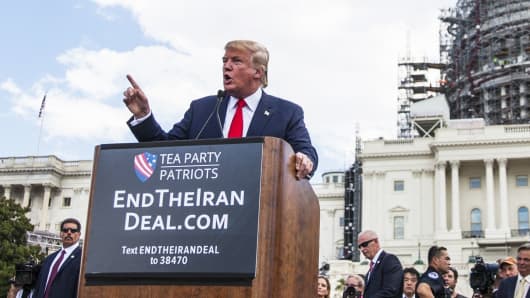CNBC - A U.S. plan to impose targeted crude sanctions against Iran could significantly impact global supply and exhaust the world's spare oil capacity cushion, according to the latest monthly report from the International Energy Agency (IEA).
The IEA's closely watched report comes shortly after the re-introduction of U.S. sanctions against Iran, which from November will also include oil exports.
"As oil sanctions against Iran take effect, perhaps in combination with production problems elsewhere, maintaining global supply might be very challenging and would come at the expense of maintaining an adequate spare capacity cushion," the Paris-based organization said Friday.
"Thus, the market outlook could be far less calm at that point than it is today," the IEA added.
International benchmark Brent crude traded at around $71.43 on Friday morning, down around 0.9 percent, while U.S. West Texas Intermediate (WTI) stood at $66.40, off more than 0.6 percent.
Crude sanctions
On Tuesday, President Donald Trump's administration reinstated sanctions targeting the Iranian government's purchase of U.S. dollars, Tehran's trade in gold and other precious metals, and it's automotive industry.
The U.S. president also warned that unless Iran — which is a member of the Organization of the Petroleum Exporting Countries (OPEC) — complies with U.S. demands, Washington will look to impose far tougher measures in early November.
The second batch of potentially more damaging sanctions will target Iran's port operators, as well as it's energy, shipping and shipbuilding industries. Petroleum-related transactions and dealings between foreign financial organizations and the Central Bank of Iran will also be impacted.
"Certainly in the short term, there are no serious issues about supply because we have seen oil production in Saudi Arabia increase, in Russia increase and in one or two other Gulf countries," Neil Atkinson, head of the oil industry and markets division at the IEA, told CNBC's "Street Signs" on Friday.
"But as we say in the report, although things may be cooling down a little bit right now, we cannot get away from the fact that later in the year … We could be in a different situation where supply may be more constrained and there would then perhaps be a risk of the oil price increasing," he added.
[caption id="" align="aligncenter" width="530"] Samuel Corum | Anadolu Agency | Getty Images Then-candidate for the Republican Presidential nomination Donald Trump speaks during a rally held by the Tea Party at the United States Capitol to speak out against President Obama's nuclear agreement with Iran in Washington, on September 9, 2015.[/caption]
Samuel Corum | Anadolu Agency | Getty Images Then-candidate for the Republican Presidential nomination Donald Trump speaks during a rally held by the Tea Party at the United States Capitol to speak out against President Obama's nuclear agreement with Iran in Washington, on September 9, 2015.[/caption]
While several global powers — including the European Union, China and India — have spoken out against the scheduled sanctions, many are expected to bow to American pressure.
The last time Iran was sanctioned, about half its current oil exports of some 2.4 million barrels were removed from the market. However, this time around, many energy analysts believe sanctions will remove far less, maybe around half the prior amount, but some onlookers have recently raised their expectations amid signs some companies are complying with tough talk from the White House.
Any reduction in Iranian crude exports will depend on whether major buyers of its oil in Asia receive sanctions waivers. Meanwhile, it is also not clear whether China — the world's biggest buyer of Iranian crude — will resist Trump's calls on November 4.
Trade tensions
Oil prices dipped on Friday amid heightened concern an escalating trade dispute between the U.S. and China could threaten economic growth and global demand for fuel. For the trading week, Brent is on course to register a near 2 percent fall, while WTI is set for a drop of almost 3 percent.
"Risks introduced by trade tensions have further increased, threatening to significantly reduce growth in some exporting countries," the IEA said Friday.
"The threat of trade disruption could recede as fast as they are mounting, however, and it is difficult at this stage to make adjustments to our base case assumptions for the economy and oil demand," the group added.
Investors are seen weighing bullish factors that include potential supply disruptions to Iranian crude exports against more bearish indicators, such as a ramp-up in production by OPEC and its allied partners.
Alongside Russia, OPEC kingpin Saudi Arabia and other members of the Middle-East dominated oil cartel agreed in late June to begin increasing production by up to 1 million barrels per day starting in August.

 QR code
QR code